Top 10 Reputable Travel Companies & Top 5 Reputable Hotels and Resorts in 2024
On December 6, 2024, Vietnam Report Joint Stock Company officially announced the Top 10 prestigious Travel Companies & Top 5 prestigious Hotels and Resorts in 2024.
Top 10 Reputable Travel Companies & Top 5 Reputable Hotels and Resorts in 2024 are built on scientific and objective principles. Companies are evaluated and ranked based on three main criteria: (1) Financial capacity shown in financial statements from 2023 to present; (2) Media reputation is assessed using the Media Coding method – encoding articles about the company on influential media channels; (3) Survey of research subjects and stakeholders conducted in October-November 2024.
List 1: Top 10 Reputable Travel Companies in 2024
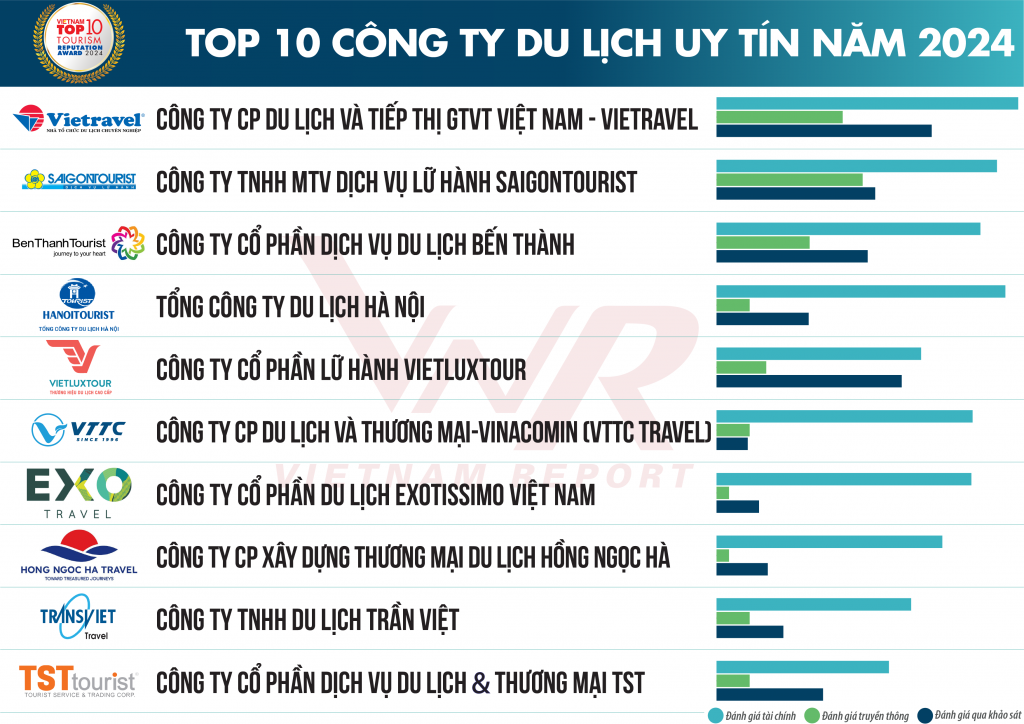
List 2: Top 5 prestigious hotels in 2024
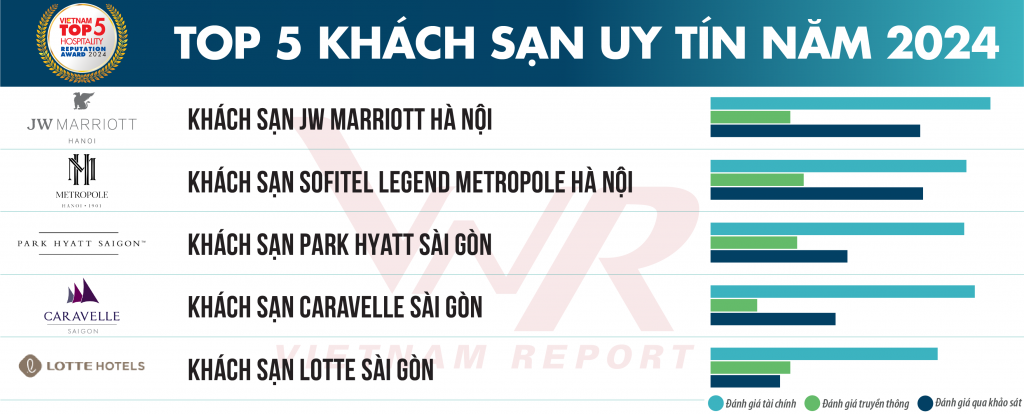
List 3: Top 5 prestigious resorts in 2024
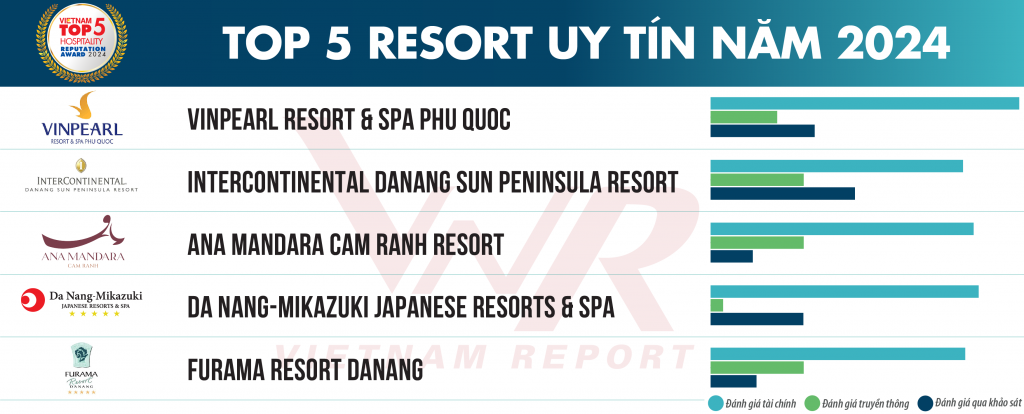
Expecting “impressive start, promising breakthrough”
Vietnam’s Tourism, Hotel and Resort industry entered 2024 with many positive signals, reflected in revenue growth in both tourism and accommodation and catering services. Specifically, in the first 10 months of the year, revenue from tourism was estimated at VND 50.3 trillion, accounting for 0.9% of total retail sales of goods and consumer service revenue, up 14.2% over the same period last year. Meanwhile, revenue from accommodation and catering services was estimated at VND 602.3 trillion, accounting for 11.5% of the total and up 12.5% over 2023. These figures show the strong recovery and development of the tourism industry after a turbulent period.
However, the business picture is clearly differentiated. According to a survey by Vietnam Report, although revenue continues to grow steadily, cost pressure is increasing, as shown by the rate of businesses reporting a decrease in profits increasing from 7.2% to 11.1%. This shows that businesses are facing major challenges in controlling costs and maintaining profit margins. In particular, increasing operating costs, the need to invest in digital technology, and the pressure to transition to a sustainable development model are creating significant financial burdens.
Figure 1: Production and business performance in the first 9 months of 2023-2024
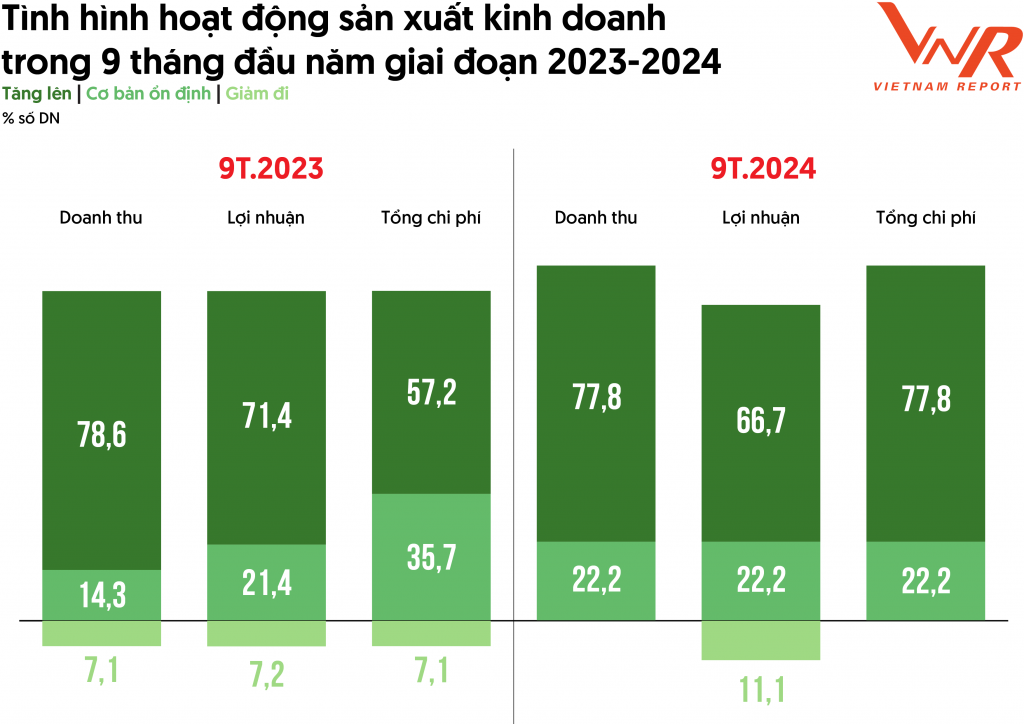
2025 is not only expected to be a year of recovery but also a time for the entire industry to transform more strongly towards sustainable development. Although still facing many difficulties, the first months of the year are expected to bring positive signals as this is the peak season for welcoming international visitors. This expectation is clearly reflected in the survey results of Vietnam Report when up to 71.4% of businesses expressed confidence in a more positive picture in 2025. The optimism of businesses is completely justified when looking at the ambitious goals set by the Vietnamese tourism industry for next year. Accordingly, the industry aims to welcome 25-28 million international visitors and 130 million domestic visitors, directly contributing 8-9% to GDP. At the same time, the industry is expected to create 6.3 million jobs, including 1.2 million direct jobs, reflecting efforts not only to recover but also to grow strongly, towards sustainable development and becoming the world’s leading attractive tourist destination.
Figure 2: Tourism & Hotel, Resort Industry Outlook in 2025
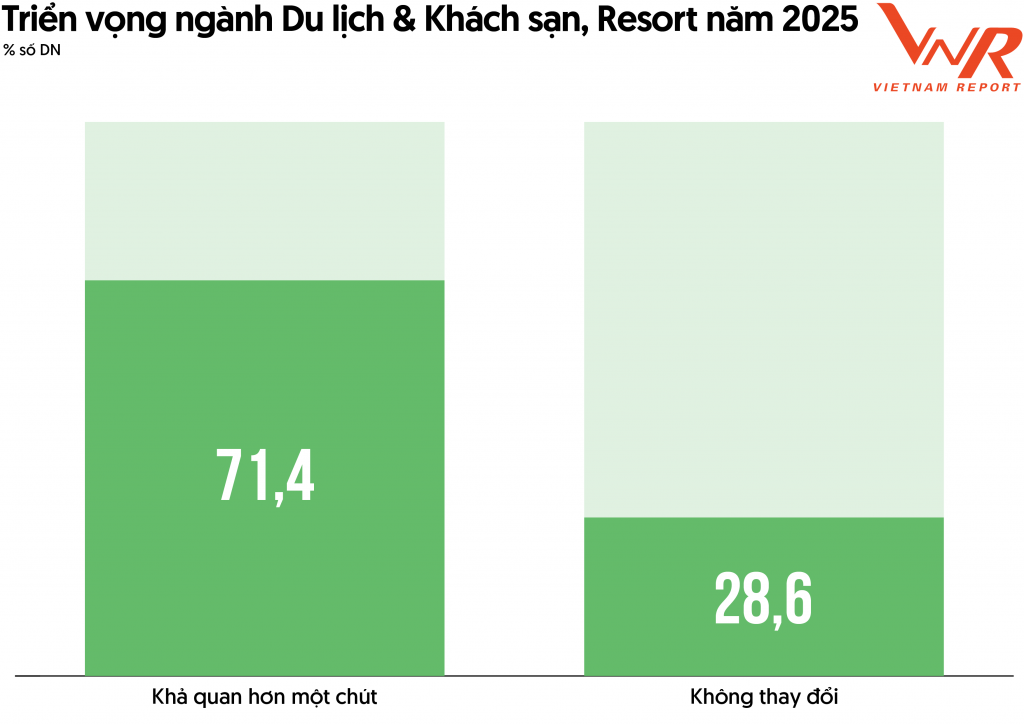
Key factors affecting the Tourism & Hospitality industry from a business perspective
Macroeconomics
The economic recovery in 2024 brings positive signals to the Tourism – Hotel and Resort industry, especially when factors such as GDP growth, reduced unemployment rate and gradually stable inflation create a favorable environment for consumer spending. As personal income improves, people tend to spend more on entertainment and recreation activities, thereby boosting demand in the domestic and international tourism industry.
In Vietnam, the stable economic growth rate and among the highest in the region have created a solid foundation to strengthen domestic purchasing power, especially among the middle and high-class. This contributes to promoting domestic and international tourism demand, as people are increasingly willing to spend on leisure and entertainment activities. At the same time, optimism about global economic growth has also brought a large number of international visitors to Vietnam, affirming the country’s position as an attractive tourist destination. Notably, in the context of global geopolitical instability, Vietnam has emerged as a safe, stable and friendly destination. This is a particularly important factor as international tourists increasingly prioritize choosing countries that provide a sense of security, from a stable political environment to safety standards in services and destinations.
Consumption Shift
Figure 3: Travel spending levels
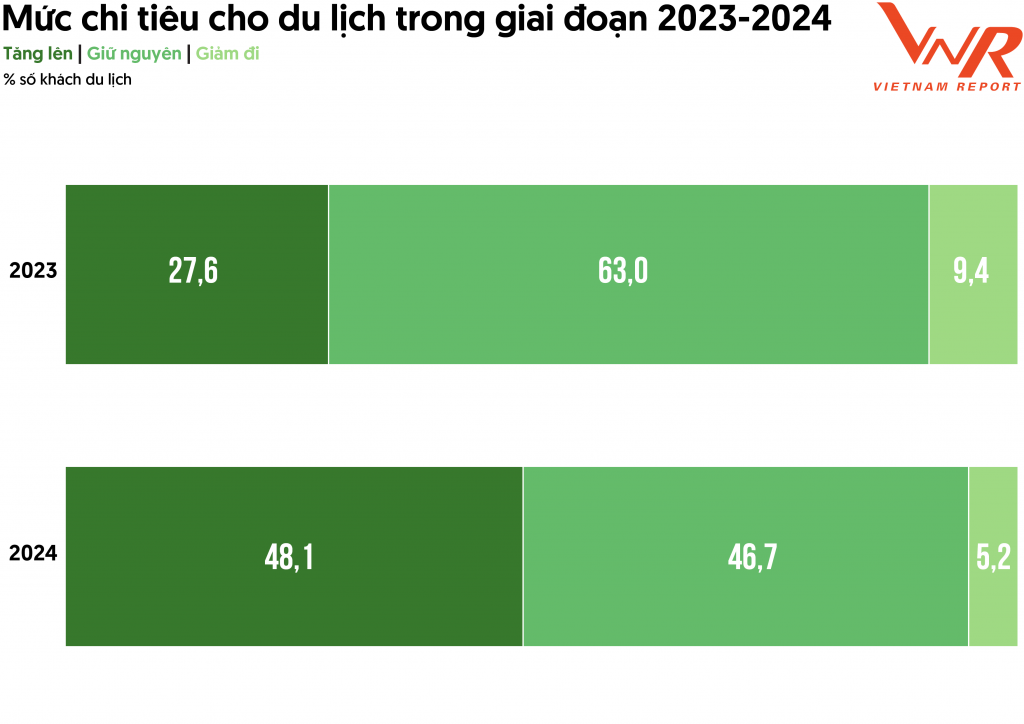
After a period of economic volatility with rising inflation, rising commodity prices and geopolitical crises, consumers have tended to save and focus their spending on essential needs. However, entering 2024, when the economy showed signs of recovery and many tourism stimulus policies were implemented, the Tourism & Hotel, Resort industry recorded initial positive signals. According to the survey results of Vietnam Report, the percentage of consumers willing to increase spending on tourism has increased significantly, reaching 48.1%, compared to only 27.6% in 2023. This is an impressive improvement, reflecting the strong recovery trend of this industry and changes in consumer behavior.
Figure 4: Changes in tourists’ choice of channels to book travel services
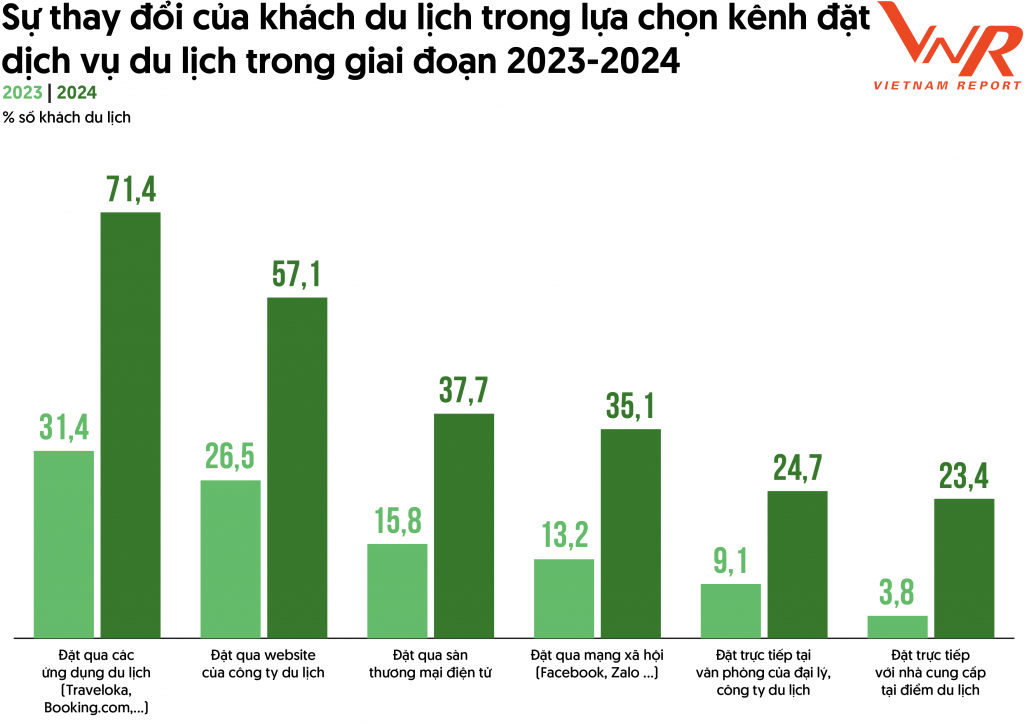
The trend of shifting from offline shopping to online channels has grown strongly in 2024. According to the results of the 2024 Consumer Trends survey by Vietnam Report, the rate of booking services through travel applications (Traveloka, Booking.com…) has increased sharply from 31.4% in 2023 to 71.4% in 2024, becoming the most popular channel. This growth is driven by the convenience, the ability to compare prices and reviews, along with attractive promotions from these platforms. Similarly, booking through travel company websites also increased from 26.5% to 57.1%, showing that businesses have invested effectively in improving the interface and optimizing the online experience. In addition, the rate of bookings via e-commerce platforms and social networks (Facebook, Zalo, etc.) also increased significantly, reaching 37.7% and 35.1% respectively in 2024. These channels are becoming increasingly popular thanks to their convenience, quick interaction and exclusive discount programs. In contrast, traditional channels such as booking directly at agency offices or with suppliers at tourist destinations recorded a clear decline, reflecting the trend of prioritizing modern online platforms. This shift is driven by the digitization of the tourism industry, technological developments and changes in consumer behavior after the pandemic, as customers increasingly look for faster, more transparent and flexible ways to book services.
The explosion of digitalization
The rapid development of artificial intelligence (AI) and virtual reality (VR) and augmented reality (AR) technologies has changed the way tourism businesses interact with customers. AI helps optimize marketing strategies through the analysis of big data, thereby better understanding customer needs and behaviors. This technology supports the personalization of marketing campaigns, such as providing suggestions for destinations, services or travel plans suitable for each customer. AI-integrated chatbots also play an important role in customer care, providing 24/7 support, helping to enhance the experience of booking tours, hotels or airline tickets. In addition, VR and AR help customers “experience” destinations before deciding. Tourists can visit hotels, resorts or tourist attractions through VR, helping them visualize their trip better. AR creates unique interactions, such as providing historical and cultural information about a place through mobile devices, enhancing the actual experience of visitors at the destination.
Priority strategies of Tourism & Hotel, Resort businesses in 2025
In the context of the digital technology boom, social networks and online websites have become the main tools in consumers’ journey to search and book services. Not only are these platforms a source of information, they also enable customers to share experiences, evaluate service quality and compare prices quickly. In response to this trend, Tourism & Hotel and Resort businesses have promptly transformed their marketing strategies, focusing on enhancing brand image and promoting marketing activities on digital channels such as Facebook, Instagram, YouTube, and official websites. This strategy is prioritized by 85.7% of businesses in the short term, reflecting the important role of improving brand recognition and attracting customers in the context of fierce competition.
Figure 5: Business priority strategy
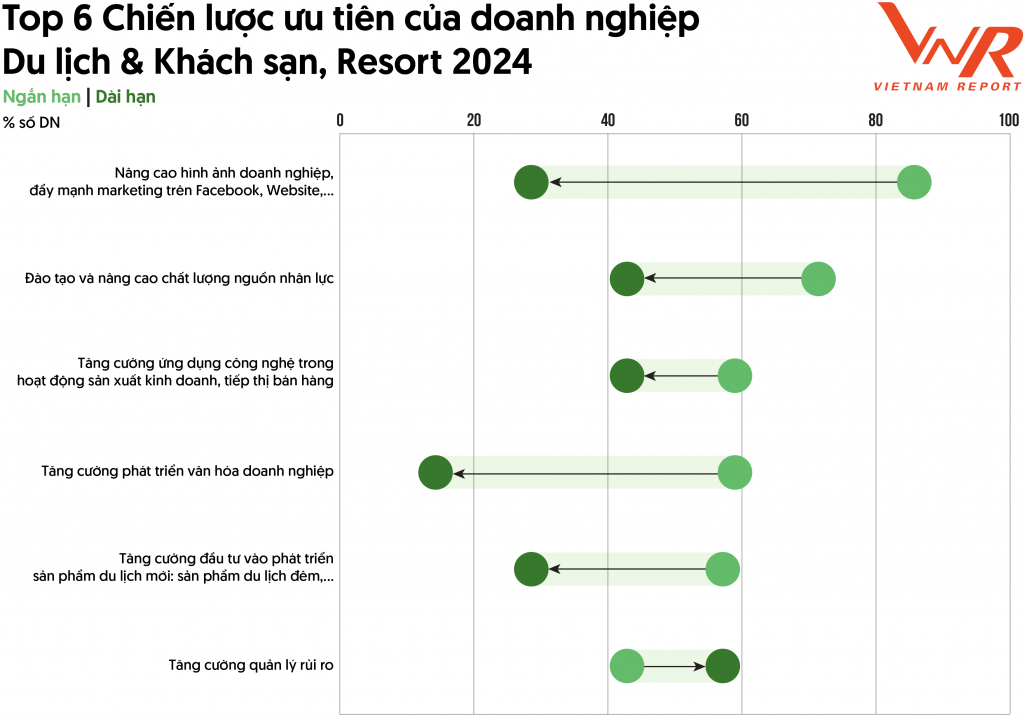
In parallel, risk management strategy has emerged as one of the top long-term priorities of businesses in the Tourism & Hospitality, Resort industry with a priority rate of 57.1%. This figure shows that businesses are increasingly aware of the importance of proactively responding to unexpected situations and unpredictable challenges. Typically, in 2024, the entire industry was severely affected by Typhoon Yagi, causing major damage to many tourist destinations, disrupting supply chains and seriously affecting business operations. In that context, risk management strategy is the key to identifying and assessing potential risks so that businesses can improve their ability to respond to emergencies, increase resilience and recover quickly after the crisis. Careful preparation not only helps businesses reduce short-term losses but also creates a solid foundation for maintaining stability and sustainable development in the long term.
Travel trends 2025
Figure 6: Tourism trends 2025
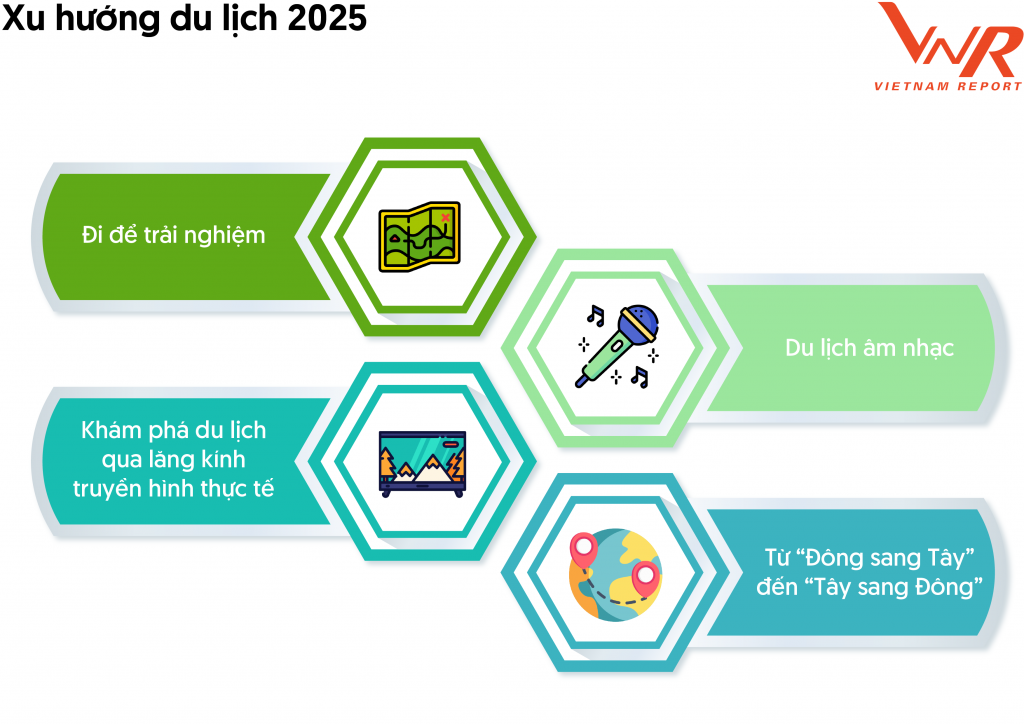
Go to experience
The travel trends for 2024–2025 are witnessing a clear shift from simple sightseeing tours to in-depth journeys of discovery, with a focus on cultural experiences and direct interactions at the destination. Modern travelers are not only passively watching but also want to immerse themselves in local life, directly participating in events, rituals or traditional activities, thereby gaining a deeper understanding of the culture, history and people of each land. This trend reflects the increasing demand for authentic, unique and emotional values in each journey.
Experientialism is also reflected in the significant change in the way tourists organize their trips. According to a survey by Vietnam Report, the proportion of tourists choosing to buy tours has decreased from 78.1% to 55.0% in 2024. Previously, when information about destinations was limited, choosing a tour with a large group was a safe and convenient solution. However, the development of technology, online platforms and social networks has created conditions for tourists to plan for themselves. Today, they prioritize independent travel, travelling in small groups or alone to personalize their schedules and enjoy a more flexible and in-depth experience.
In addition to changing forms of tourism, the choice of means of transport also clearly shows the need for increased experiences. While previously, airplanes were a popular choice for long journeys, now many tourists are switching to using personal vehicles such as self-driving cars. According to the survey results of Vietnam Report on travel trends, 46.8% of domestic tourists prioritize personal vehicles to increase initiative, freedom and comfort, instead of depending on planes, trains or buses as before. For international tourists, the need to use package tours is showing a significant decrease. Instead, they often plan their own trips, only book air tickets, rent self-driving cars and freely explore each locality according to their own schedule.
Music tourism
According to statistics from the market trend website Future Market Insights, the global music tourism market reached 5.5 billion USD in 2022 and is expected to reach 11.3 billion USD in the next 10 years, affirming its position as a potential “billion-dollar” trend. This is a field that is growing strongly in countries in the Americas and gradually spreading to Asia – Pacific, in which, Vietnam is also quickly seizing the opportunity and integrating into this trend. According to the 2023 report, Vietnamese consumers ranked second in the Asia – Pacific region in terms of frequency of participating in performing arts activities, with a rate of 41%, only after India (45%).
In fact, Vietnam is one of the countries with many international artists coming to organize music events. These events always attract a large number of fans from all over the world to attend, and therefore, the supporting tourism services also benefit a lot. For example, when the Blackpink group performed in Hanoi, the Department of Tourism estimated that the total number of tourists to Hanoi was about more than 170,000, of which international tourists reached more than 30,000. Also during the two nights of this group’s performance, the room occupancy rate of hotels around My Dinh Stadium increased by 20%. Not only music events by international artists, in recent years, concerts with a strong “pure Vietnamese” mark have received the attention of a large audience. In particular, recently, the two programs Anh trai vu ngan cong gai and Anh trai “say hi” have made a strong impression due to their methodical and large-scale investment. These two events have created a wave attracting tens of thousands of tourists to the venue. The combination of music performances and tourism creates a clear added value, not only attracting a larger number of visitors but also extending the length of stay, while stimulating spending on services such as cuisine, shopping and entertainment, creating a clear added value for the Tourism & Hotel, Resort industry.
Explore travel through the lens of reality TV
In recent years, the strong development of reality TV shows such as 2 Days 1 Night , Brilliant Journey , La ca hat ca , and Cuoc dau thuoc has created a positive impact, especially on the Tourism & Hotel, Resort industry. Not only attracting a large audience, these programs have also become effective promotional tools, introducing attractive destinations and cultural beauty and customs in Vietnam. The combination of entertainment and real-life experiences has encouraged viewers to directly explore the introduced locations.
According to a survey by Vietnam Report, 55.8% of participants said their travel trends were influenced by reality TV shows. Of these, 75.7% changed their travel destinations based on famous destinations in the shows. At the same time, 54.1% chose to use services at hotels and restaurants featured in the shows, and 45.9% noted an increase in travel frequency due to inspiration from these shows.
The positive effects of reality TV shows have been recorded in many localities across the country. Specifically, after these programs were broadcast, localities often recorded a significant increase in the number of tourists, contributing to job creation and promoting related service industries such as restaurants, hotels and transportation. In addition, these programs also contribute to promoting the natural beauty and uniqueness of local culture, while raising public awareness of conservation and sustainable tourism development. It can be affirmed that reality TV is not only an entertainment channel but also plays an important role as a bridge, helping new and little-known destinations become more prominent on the tourism map of Vietnam.
From “East to West” to “West to East”
Historically, travel trends have favored a shift from “East to West,” drawn by the appeal of unique architecture, cutting-edge technology, and lavish lifestyles. However, as the world becomes “flatter” due to globalization, travelers’ attention has shifted. More and more people are looking for unique cultural values and local experiences, making destinations in the East, especially Asia, a priority choice.
This trend not only highlights Asian countries such as Thailand, Indonesia and Vietnam on the international tourism map, but also promotes the development of domestic tourism. Vietnam Report’s survey results show that 72.7% of participants plan to focus on domestic travel in 2025. This reflects the growing desire of tourists to return to their roots, finding novelty and attraction in the most familiar places.
Sustainable Tourism: From Theory to Practice
Sustainable tourism is defined as a long-term approach that meets the needs of present tourists, travel businesses, and host communities while preserving and maintaining the ability to meet the needs of future generations. This is not only a strategic choice but also an urgent requirement in the face of declining natural resources and global social issues. The sustainable tourism development model is built on three core pillars: economic, social and environmental, with the aim of ensuring a balance between these factors throughout the entire tourism activity chain.
The role of Government and policy commitment
The term “sustainable tourism” first appeared in 1996, reflecting the importance of balancing economic, social and environmental benefits in tourism development. In Vietnam, this concept was recognized later, in 2017, in the 2017 Tourism Law. This is an important milestone, affirming Vietnam’s commitment to promoting the Tourism & Hotel, Resort industry towards sustainable values. Recently, the Government continued to show its interest in this issue by issuing Resolution No. 82/NQ-CP dated May 18, 2023. The Resolution sets out key tasks and solutions to accelerate tourism recovery and growth, while emphasizing efficiency and sustainability. However, in reality, these strategies still lack a specific roadmap and strong enforcement mechanisms to balance economic benefits, protect the environment and ensure social welfare for local communities. Vietnam Report experts commented that one of the biggest limitations is the lack of effective linkage and cooperation mechanisms between stakeholders, including state management agencies, businesses, local communities and tourists. In addition, regulations on natural resource conservation, local cultural protection, and livelihood support for local communities at tourist destinations have not been implemented synchronously. In many localities, natural and cultural tourism resources are being overexploited, negatively affecting the ecosystem and quality of life of local residents. In addition, the level of awareness and participation of people, especially local communities, in sustainable tourism development strategies is still limited. This not only hinders the implementation of sustainable goals but also reduces the ability to utilize local resources – an important factor in developing unique tourism products suitable to each region’s conditions.
To overcome these limitations, a more concrete roadmap needs to be established, including clear sustainability metrics and detailed action plans. Governments need to create financial support mechanisms and incentive policies for sustainable tourism projects, and develop awareness-raising and skills training programs for local communities to help them actively participate in the tourism value chain.
Sustainable business approach
According to a survey by Vietnam Report, up to 85.7% of businesses in the Tourism & Hospitality, Resort sector believe that implementing Environmental, Social and Governance (ESG) criteria has a significant impact on business results. This reflects the increasing importance of sustainability factors in the industry’s operations. ESG criteria not only help businesses optimize internal operations but also enhance reputation, strengthen brands and increase competitiveness in the global market.
Figure 7: Actions businesses are willing to take towards their commitment to sustainable development
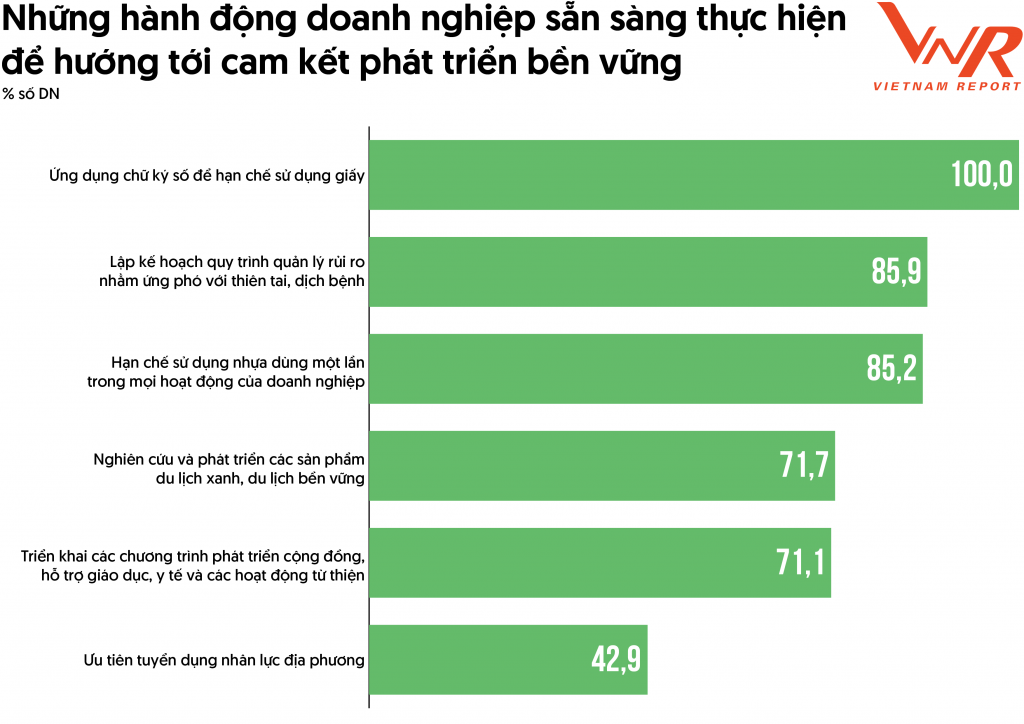
According to the survey results of Vietnam Report, in addition to the factors of Environment (E) and Governance (G), the Social factor (S) is receiving special attention from businesses. Of which, 71.1% of businesses have implemented community development programs such as supporting education, healthcare and charity activities. Investing in community development programs has a dual impact: improving living conditions in tourist areas while helping businesses strengthen the trust and sympathy of local people. This is a solid foundation to promote long-term cooperation, contributing to realizing the goal of sustainable development.
Although the rate of businesses prioritizing hiring local workers is still modest (only 42.9%), this is still an important strategy to increase the participation of local people in the industry. With a deep understanding of culture, customs and heritage, local workers can bring unique and authentic experiences to tourists, creating a unique mark for the destination. At the same time, creating local employment opportunities not only reduces unemployment but also encourages the community to preserve traditional values, thereby creating a positive cycle for local economic, social and cultural development.
Consumers lead the way to sustainable tourism
Figure 8: Tourist services are willing to pay more to promote sustainable development
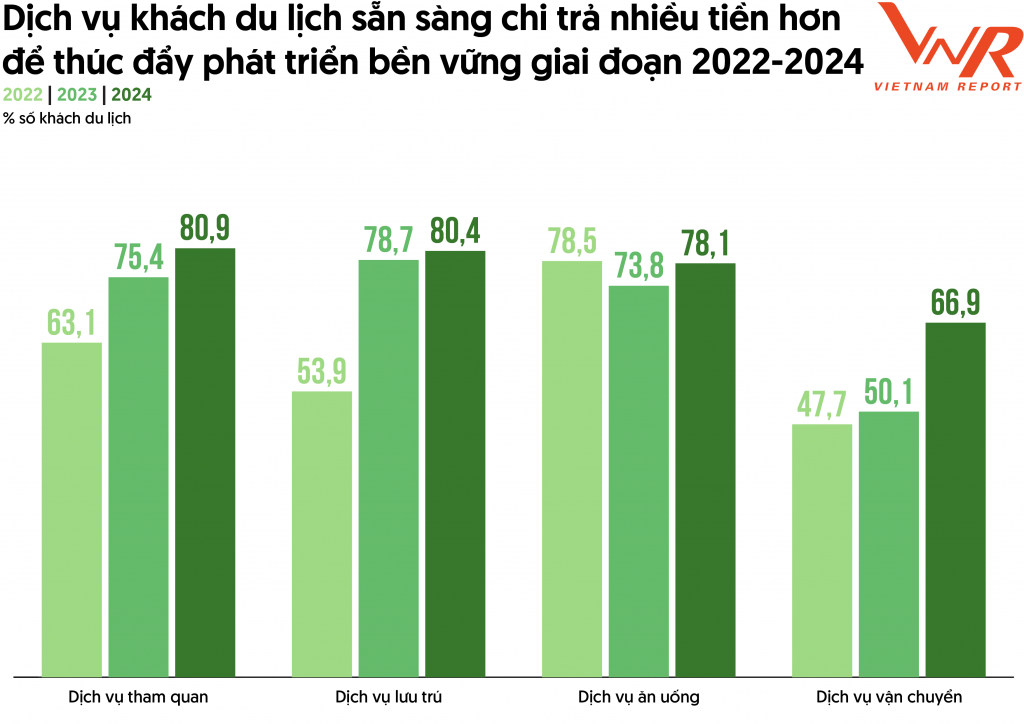
Consumers are now showing increasing interest in sustainable tourism and are willing to pay more to experience environmentally friendly and socially responsible services. According to a survey by Vietnam Report in the period of 2022-2024, this trend is clearly demonstrated by the increase in the rate of willingness to pay for sustainable tourism services over the years. Notably, sightseeing services have grown strongly, from 63.1% in 2022, to 75.4% in 2023 and reaching 80.9% in 2024. This growth is largely due to communication campaigns to raise public awareness and policies to support sustainable tourism, helping consumers better understand their important role in preserving nature and cultural heritage.
Another bright spot is the change in perception towards transportation services. This used to be the service group with the lowest willingness to pay rate, at only 47.7% in 2022. However, by 2024, this rate had increased sharply to 66.9%, indicating a positive shift in customer behavior. This breakthrough growth can be attributed to many factors such as global carbon emission reduction initiatives, the popularity of green vehicles (such as electric vehicles and vehicles running on renewable energy), along with support from incentive policies from the Government and businesses in the industry.
Figure 9: Tourist actions that help develop sustainable tourism
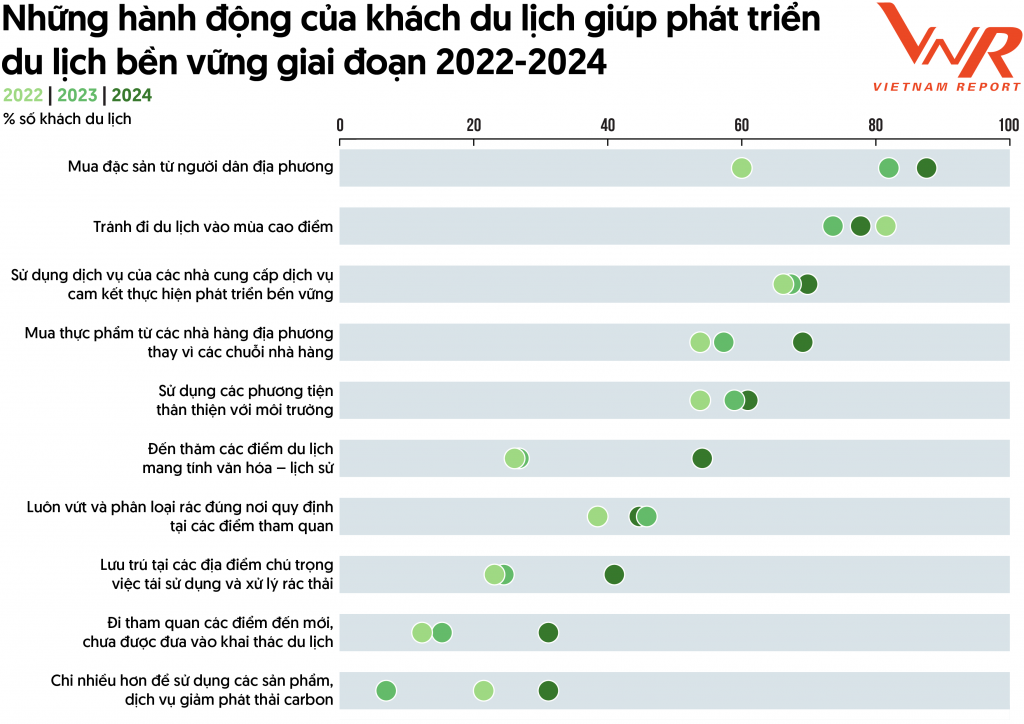
Another aspect of sustainable tourism is the role of local people in the value chain. Although they are often the most vulnerable group, they play a key role in preserving culture and solving social problems at the destination. During the period 2022–2024, the proportion of tourists choosing to buy specialties from local people increased from 60.0% in 2022 to 87.6% in 2024. At the same time, the proportion of tourists choosing to “Buy food from local restaurants instead of restaurant chains” also maintained a steady growth momentum (from 53.8% to 69.1%). This action not only helps generate direct income but also maintains traditional occupations, contributing to the preservation of cultural identity.
Evaluation of communication activities of the Tourism – Hotel industry
Vietnam Report’s Media Coding analysis results show that the most frequently appearing topics in the media for the Tourism & Hotel, Resort industry include: (1) Image/ PR/ Scandals; (2) Products; (3) Price; (4) Market position and (5) Social responsibility. Notably, there has been a change in the first three topic groups when Image/ PR/ Scandals rose to the number one position, reflecting the strong focus of businesses on building image and brand positioning. Instead of focusing only on product development or competing on price, businesses increasingly focus on building trust and sympathy from customers through professional communication strategies.
Figure 10: Top 5 topics appearing most in the media in the period 2019-2024
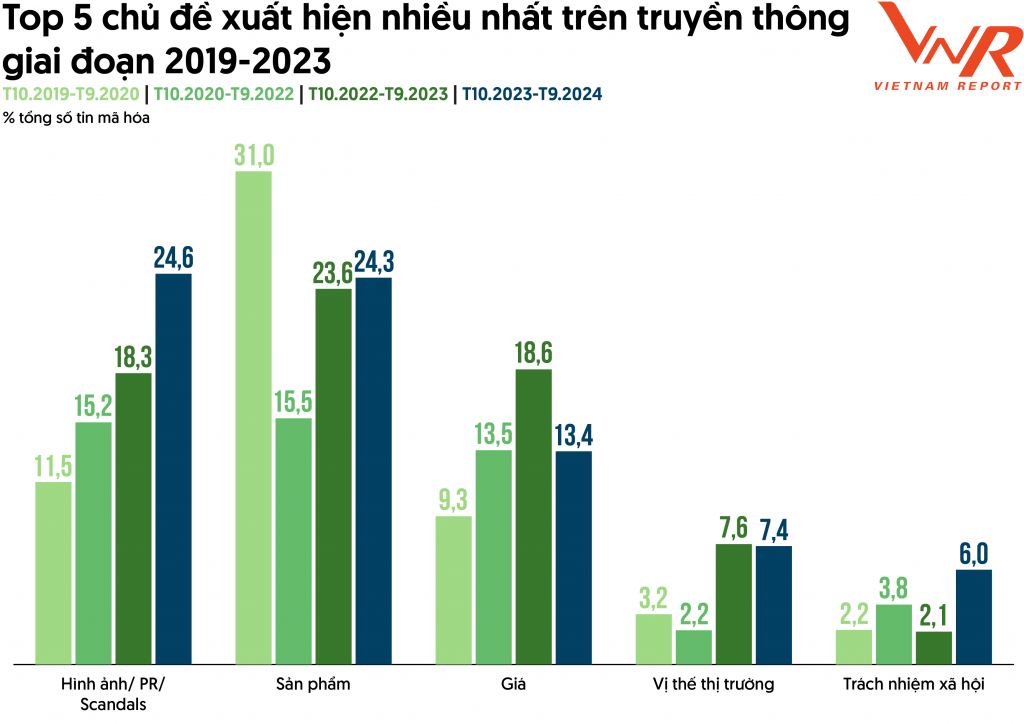
Regarding information quality, businesses in the Tourism & Hotel, Resort industry are considered “safe” when the difference between positive and negative information compared to the total amount of encoded information reaches 10%, and reaches the “best” threshold when it is over 20%. According to statistics in the past 3 years, information quality has improved significantly over the years, not only reflecting the efforts of businesses in building a positive brand image but also demonstrating more professionalism in communication management strategy. Maintaining an outstanding positive information ratio brings many benefits to businesses, from strengthening reputation, enhancing trust leading to increased ability to attract customers and partners. This is a vital factor in the Tourism & Hotel, Resort industry, where customer experience and reviews directly affect business performance. The continuous improvement in information quality also reflects the ability of businesses to quickly adapt to the strict requirements for transparency and reliability in the digital age.
Figure 11: Information quality of Tourism & Hotel, Resort businesses in the period 2022-2024
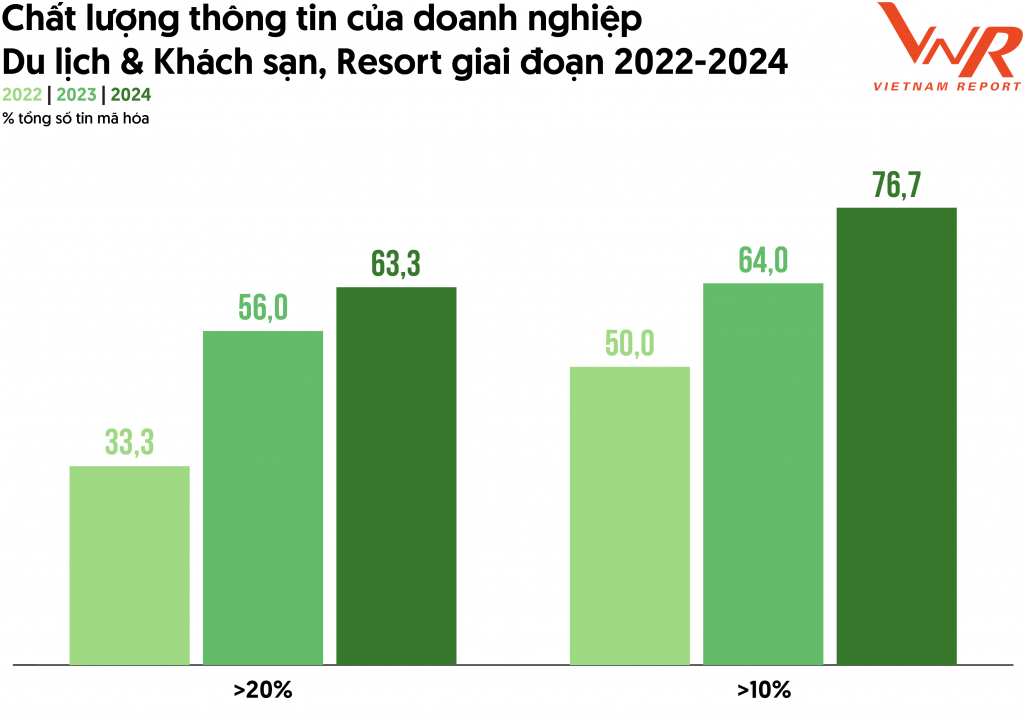
The ranking of Top 10 prestigious Travel Companies & Top 5 prestigious Hotels and Resorts in 2024 is the result of independent and objective research by Vietnam Report, published annually since 2017, based on the Media Coding method (encoding press data) in the media that has been applied by Vietnam Report and its partners since 2012, combined with in-depth research on key industries with high growth potential such as: Real Estate, Construction, Technology, Banking, Insurance, Food – Beverage, Retail…
The method of media analysis research to evaluate the reputation of companies based on the Agenda Setting theory on the influence and impact of mass media on the community and society was officially announced by two professors Maxwell McCombs and Donald L. Shaw in 1968, realized and applied by Vietnam Report and its partners. Accordingly, the Vietnam Report used the Branch Coding method (assessing the company’s image in the media) to analyze the reputation of Tourism – Hotel and Resort businesses in Vietnam.
Vietnam Report conducts coding of articles about Tourism & Hotel, Resort businesses published in influential newspapers and channels in Vietnam from October 2023 to September 2024, evaluating at the story level 24 specific aspects of the companies’ operations from products, business results, markets… to the activities and reputation of the company’s leaders. The information selected for coding is based on 2 basic principles: The company name appears right on the title of the article, or the news about the company mentioned takes up at least 5 lines in the article, this is called the threshold of awareness – when the information is assessed as having analytical value. The information is assessed at the following levels: 0: Neutral; 1: Positive; 2: Quite positive; 3: Unclear; 4: Quite negative; 5: Negative. However, statistically, the research team gave 3 levels for the final assessment, including: Neutral (including 0 and 3), positive (1 and 2), and negative (4 and 5).
The comments in the announcement are general and for reference only to businesses and partners; they are not personal comments and do not serve the purpose or needs of any specific investor. Therefore, related parties should carefully consider the suitability of the above information before using it to make investment decisions and are fully responsible for the use of such information.
The official announcement ceremony of the ranking and honouring of the Top 10 prestigious Travel Companies & Top 5 prestigious Hotels and Resorts in 2024 will be held in January 2025 in Hanoi.
For more details, please visit the Organizing Committee’s website: https://toptenvietnam.vn/.






 © 2018 Furama Resort Danang.
© 2018 Furama Resort Danang. 